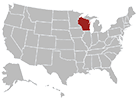
If you have a dream of working in the medical field, you do not need eight years of schooling to get started.
Learn how to become a Medical Assistant in Wisconsin in less than a year.
Page Navigation
Licensing Requirements to Become a Medical Assistant in Wisconsin
Medical Assistants who work in Wisconsin do not need a specific license.
However, you need the skills and experience required by most healthcare employers.
This usually involves achieving one of the following certifications:
- The Certified Medical Assistant (CMA) offered by the American Association of Medical Assistants (AAMA)
- Registered Medical Assistant (RMA) supplied by the American Medical Technologists (AMT)
- Certified Clinical Medical Assistant (CCMA) or the Certified Medical Administrative Assistant (CMAA) provided by the National Healthcareer Association (NHA).
- Certified Medical Assistant (MA, or CMA) National Center for Competency Testing (NCCT)
Probably the most popular in Wisconsin is the NHA certificate.
However, that depends on your career goals, and all of these credentialing bodies have received respect and have their own accreditations.
This particular certification host offers both the CCMA, which prepares you for a clinical setting and the CMAA, which provides you with readiness for medical office work.
You could also certify in both, which MAs often do.
When choosing a school, it is important to select the one that will prepare you for the exam you plan to take once you finish your coursework.
Otherwise, you may have to order supplemental exam preparation and study materials from the association of your choice.
5 Medical Assistant Schools in Wisconsin
1. Northeast Wisconsin Technical College (NWTC)

You can take either the CMAA learning track or the CCMA learning track.
The CMAA, which prepares you for scheduling patient appointments and greeting them when they walk in, takes about six months.
This coursework also introduces you to the billing and coding required for handling patient invoices and insurance claims.
The CCMA training takes 12 months, and it shows you ethical patient treatment and OSHA health and safety laws.
In addition, you receive updated information from the American Dental Association that would prepare you for dental assistance.
This schooling will also make you comfortable with taking patient vital signs, enable you to identify human body parts and systems, and help with administering therapeutic care.
As a CCMA, you may end up drawing blood (phlebotomy) or taking EKG heart readings, but you need to specify an interest in those skills when you register.
2. MedCerts

Wisconsin does have plenty of in-person learning opportunities for Medical Assistants.
However, you can also take this (partially) online certificate training, which prepares you for a CCMA position in about 28 weeks.
The health, safety, and ethical treatment information are included, and you will receive real-life experience handling lab specificnesses, such as blood or urine tests.
You will also receive a foundation in pharmacology.
Taking vital signs, practicing infection control, and room sterilization will also become second nature to you after completing this training.
3. Blackhawk Technical College

You can enroll in a 32-credit Medical Assistant Technical Diploma program at Blackhawk and attend both in-person and online.
For this training, you are not necessarily locked into a specific completion date.
Most certificate programs like this one, however, do take an average of six to 12 months.
This particular training covers both the front desk and exam room services you would do.
For instance, you will receive time practicing what you would say to patients when they call or enter the practice where you work.
In addition, you will learn how to order equipment and supplies, and help out with lab tests.
After receiving this training, you could work on an EMT team, or you could work for an insurance company, industrial or business centers, and hospitals or doctors’ offices and public clinics.
4. Madison Area Technical College

Your Medical Assistant Technical Diploma schooling, which you could complete in about a year, will prepare you for a variety of roles.
For instance, this education could help you find a position as an EKG Technician, Phlebotomist, Receptionist, and Pharmacy Aid – all of which generate around the same amount of money per year.
You will receive job placement assistance during your last semester, and you will also fulfill some of your required certificate exam hours.
5. Lakeshore Technical College

The two-semester Medical Assistant training at Lakeshore will prepare you for a clinical and clerical MA position.
You could work in a lab or as an administrative assistant, or you can help patients in a doctor’s office or ambulatory unit.
The clinical practice you would receive in this training includes taking patient vital signs, reviewing and filing patient records, and drawing blood.
You will also have a chance to learn how to reach an EKG machine chart and administer medicine as directed by the doctor on duty.
Medical Assistant Schools in Wisconsin – Summary Table
Top 5 Schools in Wisconsin
| School Name | Address |
|---|---|
| Northeast Wisconsin Technical College | 2740 W Mason St, Green Bay, WI 54307 |
| MedCerts | 14143 Farmington Road. Livonia, MI 48154 |
| Blackhawk Technical College | 6004 S County Rd G, Janesville, WI 53546 |
| Madison Area Technical College | 1701 Wright St, Madison, WI 53704 |
| Lakeshore Technical College | 1290 North Ave, Cleveland, WI 53015 |
Salary
The average Medical Assistant’s yearly income in Wisconsin is about $37,345.
Earnings usually range from $34,431 to $40,326 as of 2022.
You can also keep adding certifications and earn more than $43,040 every year if you put your mind to it.
This position could also prepare you for a nursing career.
Some major cities where you can find Medical Assistant employment include Appleton, Green Bay, Madison, Racine, and Milwaukee.
You are not limited to those locations, however.
Search for jobs near you, including these places: Medford, Sun Prairie, Menominee Falls, or West Allis (a Milwaukee neighborhood).
Annual Salary Range:Average Salary of Medical Assistants in Wisconsin
| City Name | Salary |
|---|---|
| Milwaukee | $37,523 |
| Madison | $37,150 |
| Green Bay | $36,371 |
| Kenosha | $37,246 |
| Racine | $37,246 |
| Appleton | $36,379 |
| Waukesha | $37,382 |
| Oshkosh | $36,143 |
| Eau Claire | $35,349 |
| La Crosse | $34,623 |
Regional Salary in Wisconsin
| Region | Employed | Avg. Annual Salary | Avg. Hourly Pay | Top 10% Annual Salary | Bottom 10% Annual Salary |
|---|---|---|---|---|---|
| Appleton, WI | 450 | $44,540 | $21.42 | $52,410 | $36,100 |
| Eau Claire, WI | 560 | $44,880 | $21.58 | $48,560 | $37,440 |
| Fond du Lac, WI | 220 | $43,820 | $21.07 | $48,480 | $37,720 |
| Green Bay, WI | 740 | $44,720 | $21.5 | $50,120 | $37,290 |
| Janesville-Beloit, WI | 270 | $43,500 | $20.91 | $49,400 | $37,010 |
| La Crosse-Onalaska, WI-MN | 470 | - NA - | - NA - | - NA - | - NA - |
| Madison, WI | 1,890 | $45,820 | $22.03 | $52,460 | $40,020 |
| Milwaukee-Waukesha-West Allis, WI | 3,770 | $46,410 | $22.31 | $54,830 | $38,340 |
| Oshkosh-Neenah, WI | 430 | $42,970 | $20.66 | $47,940 | $37,220 |
| Racine, WI | 260 | $44,350 | $21.32 | $49,080 | $37,260 |
| Sheboygan, WI | 340 | $44,340 | $21.32 | $52,260 | $37,520 |
| Wausau, WI | 380 | $44,460 | $21.38 | $49,510 | $37,350 |
* Employment conditions in your area may vary.
Frequently Asked Questions
How much does Medical Assistant training cost in Wisconsin?
The certificate programs, which run for a year or less, cost about $5,000-$6,000 per year.
However, financial aid may be available, and you can also start working, which you need to do anyway, as soon as possible before you take your national certification exam.
Is the certification exam included in my MA tuition?
Some Wisconsin schools will include a voucher to use on an exam of your choice.
Check with schools you are interested in to find out what certifying bodies they partner with.
Do I need a degree to be a Medical Assistant in WI?
No, you do not.
Usually, you only need less than a year of training before you start working.
However, you may limit yourself unless your training has phlebotomy, EKG machine operation, infection control, sterilization practices, and other certification component training as an all-in-one solution.
If you want to become a nurse, that is also another reason to pursue an associate’s or bachelor’s degree.
Does a Medical Assistant prepare you for other careers?
Yes, it does.
You receive practice with working directly with patients, using needles, blood pressure machines, and cardiac rhythm testing systems.
In addition, if you learn computer training, you could use that experience when pursuing an administrative or management career.
Any experience at all working in a medical setting will also prepare you for a nursing or physician career.
Who does a WI Medical Assistant usually work with?
You will have some peers if you work in a large hospital.
You will also cooperate with ambulance drivers, receptionists, and doctors or nurses.




